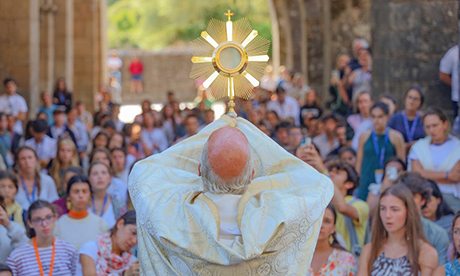Young Spanish Catholics are increasingly drawn to the burgeoning Hakuna movement which has extended its reach to more than 15 other countries.
The movement, founded by Fr José Pedro Manglano, is characterised by its focus on music, adoration, formation talks, charity activities, retreats and missionary work.
Hakuna has also made waves on social media with its Catholic pop music, amassing a significant following on platforms like Instagram and YouTube.
While many Catholic groups struggle to engage young people, Hakuna’s growth is undeniable – and fast.
Hakuna has spread to almost 40 Spanish cities, another 10 European countries, six Latin American countries plus South Korea and Boston. The group says it plans to start soon in other American cities.
Something changed
Hakuna’s origins can be traced back to Madrid a decade ago. It started when Fr Manglano led a group of students to World Youth Day in Rio de Janeiro in 2013.
Victoria González, one of Hakuna’s earliest members, explained that they sought to enhance their spiritual formation beyond what they received in school, leading to the formation of the group.
“I couldn’t go to Rio because I had started working, but seeing how my friends came back was amazing. Something changed in them,” González said.
A few attendees formed a little Catholic pop music group and started releasing songs online while working on an album.
The movement’s core activities include organising holy hours with spiritual talks, serving the poor and creating Catholic pop music. These endeavours aim to reflect their belief in “radical joy.”
Ecclesial identity recognised
The Hakuna movement had its ecclesial identity recognised when Cardinal Carlos Osoro of Madrid approved it as a private association of the faithful in 2017.
In 2018, 1,500 members of Hakuna went to Rome to be greeted by the pope who approvingly called them a “great Eucharistic family.”
Hakuna’s impact extends beyond music and adoration.
They’ve ventured into publishing books, hosting concerts in renowned venues and conducting theology courses and spiritual retreats. Fr Manglano, who embodies the spirit of the movement, emphasises the importance of authentic service and love for all.
Core values align
Critics have noted Hakuna’s informality, both in its liturgical practices and in its deviation from traditionalist norms within the Church.
Fr Manglano acknowledges that Hakuna’s form may seem modern, but he emphasises that the core values of the movement align with the earliest Christian communities’ ideals.
Hakuna’s distinctive charism revolves around three principles: living with the joyful face of the resurrected Christ, embracing every reality with the unmeasured love of the Cross, and fostering unity within the Church. Their spirituality is deeply rooted in the Eucharist and in a commitment to service.
For some members, the Hakuna movement has become a vocation. For others, it serves as a gateway to rediscovering their faith and deepening their relationship with God.
Life is Joy
Manglano stated that the heart of that life is joy.
“We just live the joy of being Christians. Christ is risen and, after that, any situation of death is a situation of light because Christ’s life has triumphed over death, the Father’s love overcomes any situation or deathlike condition. It’s the joy of living a new life and becoming a new man according to a God that loves us beyond all limits we may put with a love that transfigures reality, transfigures our person,” Manglano said.
“It’s the joy of knowing that heaven begins here,” he added.
